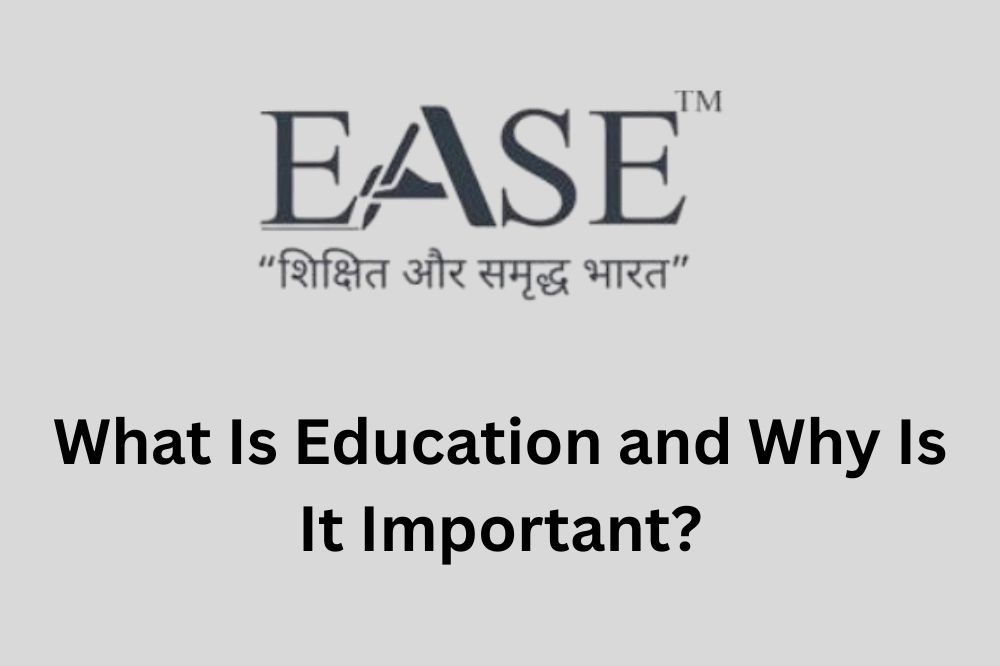In a world driven by technology, competition, and constant change, education is no longer a luxury—it’s a necessity. It’s the foundation of personal success, national development, and global progress. Whether you’re a student preparing for board exams, a teacher shaping young minds, or a school owner building a learning ecosystem, understanding the true meaning and importance of education is essential.
At EaseEdu, we believe education is not just about passing exams—it’s about unlocking human potential. This guide explores what education truly means, why it matters, and how it transforms lives at every stage.
What Is Education?
Education is the structured and intentional process of learning that helps individuals acquire knowledge, skills, values, and habits. It shapes how we think, communicate, solve problems, and contribute to society.
Types of Education:
- Formal Education: School, college, and university learning with certified curricula
- Informal Education: Learning from life experiences, family, media, and surroundings
- Non-formal Education: Skill-based learning through online courses, workshops, and coaching
NFAT Exam Syllabus 2025–26
Why Is Education Important?
Education plays a vital role in shaping individuals and societies. Here’s how:
1. Cognitive Development and Critical Thinking
Education trains the brain to think logically, solve problems, and make informed decisions.
- Enhances memory, focus, and reasoning
- Encourages curiosity and independent thinking
- Builds analytical and creative skills
2. Career Readiness and Economic Empowerment
Education provides the qualifications and skills needed for employment and entrepreneurship.
- Opens doors to better job opportunities
- Promotes financial independence and stability
- Encourages innovation and business growth
3. Communication and Social Skills
Education improves how we express ideas, listen, and collaborate.
- Builds confidence in speaking and writing
- Enhances teamwork and leadership
- Promotes respectful dialogue and empathy
4. Civic Responsibility and Social Awareness
Educated citizens are more likely to engage in community service, vote responsibly, and support social justice.
- Promotes understanding of rights and responsibilities
- Encourages respect for diversity and inclusion
- Strengthens democratic values
5. Health Literacy and Well-being
Education helps people make informed health decisions and adopt healthier lifestyles.
- Increases awareness of hygiene, nutrition, and safety
- Reduces risky behaviors and improves mental health
- Enhances access to healthcare resources
6. Emotional Intelligence and Personal Growth
Education nurtures emotional maturity, resilience, and self-awareness.
- Builds empathy and compassion
- Supports goal-setting and motivation
- Helps manage stress and relationships
Role of Education in Society
Education is the backbone of a progressive society. It:
- Reduces poverty and inequality
- Promotes gender equality and women empowerment
- Encourages environmental sustainability
- Builds peaceful, inclusive communities
- Drives technological and cultural advancement
Education Across Life Stages
| Life Stage | Educational Impact |
|---|---|
| Early Childhood | Develops curiosity, language, and motor skills |
| School Age | Builds academic foundation and social behavior |
| Teenage Years | Shapes identity, career goals, and emotional strength |
| Adulthood | Enhances job skills, financial literacy, and decision-making |
| Senior Years | Promotes lifelong learning, wisdom sharing, and mental agility |
Role of Education in Skill Development
FAQs – People Also Ask
Q: What is the real meaning of education?
Education is the lifelong process of learning that empowers individuals to grow intellectually, emotionally, and socially.
Q: Why is education important for students?
It helps students build knowledge, confidence, and career readiness while shaping their values and worldview.
Q: How does education impact society?
It reduces inequality, promotes civic responsibility, and drives economic and cultural progress.
Q: Can education improve mental health?
Yes. It fosters emotional intelligence, self-awareness, and access to mental health resources.
Q: What are the long-term benefits of education?
Better job prospects, improved quality of life, informed decision-making, and stronger communities.
Conclusion: Education Is the Power Behind Progress
Education is not just a tool—it’s a transformation. It empowers individuals to rise above limitations, equips societies to solve complex challenges, and fuels innovation across every sector. Whether you’re a student chasing dreams, a teacher shaping futures, or a school owner building impact, education is your strongest ally.
At EaseEdu, we’re committed to making education accessible, engaging, and effective. From academic reels to SEO-rich blogs, we help institutions and learners thrive in a fast-changing world.
“Education is the passport to the future. EaseEdu is your guide.”
📞 Ready to elevate your school’s educational impact? Let’s build something extraordinary—together.

